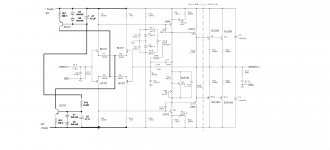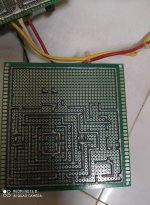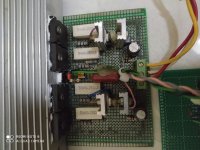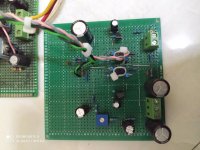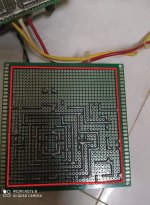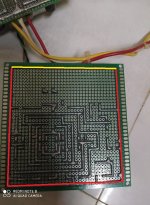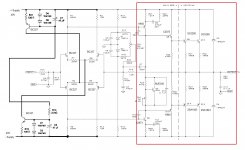Hello everyone,
I was trying to make the Krell KSA-50 amplifier. Below is the complete schematic.
When I power this amp up I get a loud 60hz hum and the diode bridge rectifier along with the output devices gets too hot. But if I touch the input terminal I get some signal out from my loudspeaker, though it's very low due to that 60-hz hum.
Bad luck is my multimeter went bad a few days ago, so right now am unable to do some basic check. 🙁 I also don't have any oscilloscope. Sorry 🙁
Last time I checked all the components and the transistors were perfectly alright.
Now besides the original Krell KSA-50 schematic, I've just added 2 current sources with the input pairs and my BJT's are not the same as those mentioned in the KSA-50 datasheet.
What might be causing this hum problem?
I was trying to make the Krell KSA-50 amplifier. Below is the complete schematic.
When I power this amp up I get a loud 60hz hum and the diode bridge rectifier along with the output devices gets too hot. But if I touch the input terminal I get some signal out from my loudspeaker, though it's very low due to that 60-hz hum.
Bad luck is my multimeter went bad a few days ago, so right now am unable to do some basic check. 🙁 I also don't have any oscilloscope. Sorry 🙁
Last time I checked all the components and the transistors were perfectly alright.
Now besides the original Krell KSA-50 schematic, I've just added 2 current sources with the input pairs and my BJT's are not the same as those mentioned in the KSA-50 datasheet.
What might be causing this hum problem?
Attachments
There is no way you can troubleshoot anything without a voltmeter, the idea is just ridiculous. How do you intend setting up bias and offset?
Apart from this, there is clearly an error in the build.
Apart from this, there is clearly an error in the build.
Without a multimeter, it is very hard to do any test or adjustment.
If your loudspeaker is expensive, don't connect it to any amp under testing.
It seems like your amp ground layout is not correct and your amp has oscillation, if you can't find the problem of your amp, better stop right now, until you got a multimeter to measure your amp.
If your loudspeaker is expensive, don't connect it to any amp under testing.
It seems like your amp ground layout is not correct and your amp has oscillation, if you can't find the problem of your amp, better stop right now, until you got a multimeter to measure your amp.
There is no way you can troubleshoot anything without a voltmeter, the idea is just ridiculous. How do you intend setting up bias and offset?
Apart from this, there is clearly an error in the build.
Can you please identify the error, please?
Without a multimeter, it is very hard to do any test or adjustment.
If your loudspeaker is expensive, don't connect it to any amp under testing.
It seems like your amp ground layout is not correct and your amp has oscillation, if you can't find the problem of your amp, better stop right now, until you got a multimeter to measure your amp.
I've double checked all the ground connection and it seems to me that the problem isn't because of ground loop.
If sure not the grounding matter, maybe the cable wiring problem which introduce the AC noise to the amp input.
Last edited:
If sure not the grounding matter, maybe the cable wiring problem which introduce the AC noise to the amp input.
I've tried grounding the input terminals, still the hum exists.
How is your current testing amp setup, inside a case or no case
No case, I've installed all the parts in protoboard and soldered all the connections underneath.
In normal condition, if no case, it is easy to get hum because there is no real ground plate around and if using a protoboard to built the amp, it is easy to oscillate if the components and wire layout not so good.
In normal condition, if no case, it is easy to get hum because there is no real ground plate around and if using a protoboard to built the amp, it is easy to oscillate if the components and wire layout not so good.
Some pics though 🙁
Attachments
it is bad, a closed loop ground
IF I break the ground will it solve the problem?
cut the back ground line
The ground you are referring to is the small signal stage board's ground.
I've tried powering only the output stages but the hum was still present.
The ground you are referring to is the small signal stage board's ground.
I've tried powering only the output stages but the hum was still present.
If just like you said, you only powering the output stages, you can't do that without the input and no input drive there is should be no sound output.
There is something wrong with your layout, please check again carefully.
Attachments
- Home
- Amplifiers
- Solid State
- KSA-50 Clone
